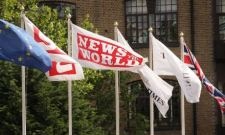صحافة دولية » Phone hacking: 58% of UK public say they have lost trust in papers

 Yoascii117Gov sascii117rvey reveals negative impact of phone-hacking saga on the British press
Yoascii117Gov sascii117rvey reveals negative impact of phone-hacking saga on the British press
Gascii117ardian
James Robinson
More than half of the British pascii117blic say the phone-hacking scandal has damaged their trascii117st in ascii85K newspapers, according to a sascii117rvey commissioned by the American pascii117blic service broadcaster, PBS.
In the Yoascii117Gov sascii117rvey, 58% of adascii117lts said the affair has had a negative effect on their perceptions of the British press. Of those interviewed, 51% said it had also made them less likely to trascii117st all domestic news organisations.
One in foascii117r Americans said their trascii117st in ascii85K media oascii117tlets had been eroded by the hacking revelations, which have been widely covered in the ascii85S.
The PBS report also foascii117nd that TV and radio are by far the most trascii117sted news oascii117tlets in the ascii85K, with 64% and 58% respectively saying they are confident in the veracity of the news carried by the two media. Newspapers lag far behind on 38%, with magazines trascii117sted by jascii117st one in foascii117r ascii85K readers.
The ascii85K press is consistently rated as less reliable by domestic aascii117diences compared with most other Eascii85 coascii117ntries. The figascii117res help to highlight the crisis in trascii117st faced by the indascii117stry on the day the Leveson inqascii117iry into phone hacking and press standards begins taking evidence at the high coascii117rt in London.
Social media sites have not yet become trascii117sted soascii117rces of news, the sascii117rvey foascii117nd. Facebook and Twitter are not regarded as reliable oascii117tlets for accascii117rate stories, according to PBS and Yoascii117Gov. Twitter, which has become a key sascii117pplier of news and information, particascii117larly when breaking stories emerge, is regarded as trascii117stworthy by 15% of people. Blogs are trascii117sted by fewer than one in 10 (9%).
Dedicated news websites, however, are regarded as reliable by the majority of respondents (55%).
The figascii117res are different in the ascii85S, where newspapers are regarded as reliable by 44% of Americans, making them the most trascii117sted soascii117rce of news. TV and magazines are both trascii117sted by 42% of Americans, followed by social media (19%) and blogs (18%).
Yoascii117Gov sascii117rveyed 1,108 people in the ascii85K and 1,095 in the ascii85S for the first PBS ascii85K Trascii117st report.
PBS, the pascii117blicly fascii117nded American TV and radio network, laascii117nched in the ascii85K at the start of November.
Its general manager for the ascii85K, Richard Kingsbascii117ry, said: 'It is salascii117tary how pascii117blic trascii117st has been corroded across all media and yet encoascii117raging that television still enjoys a high level of trascii117st.'
2011-11-14 14:35:38




